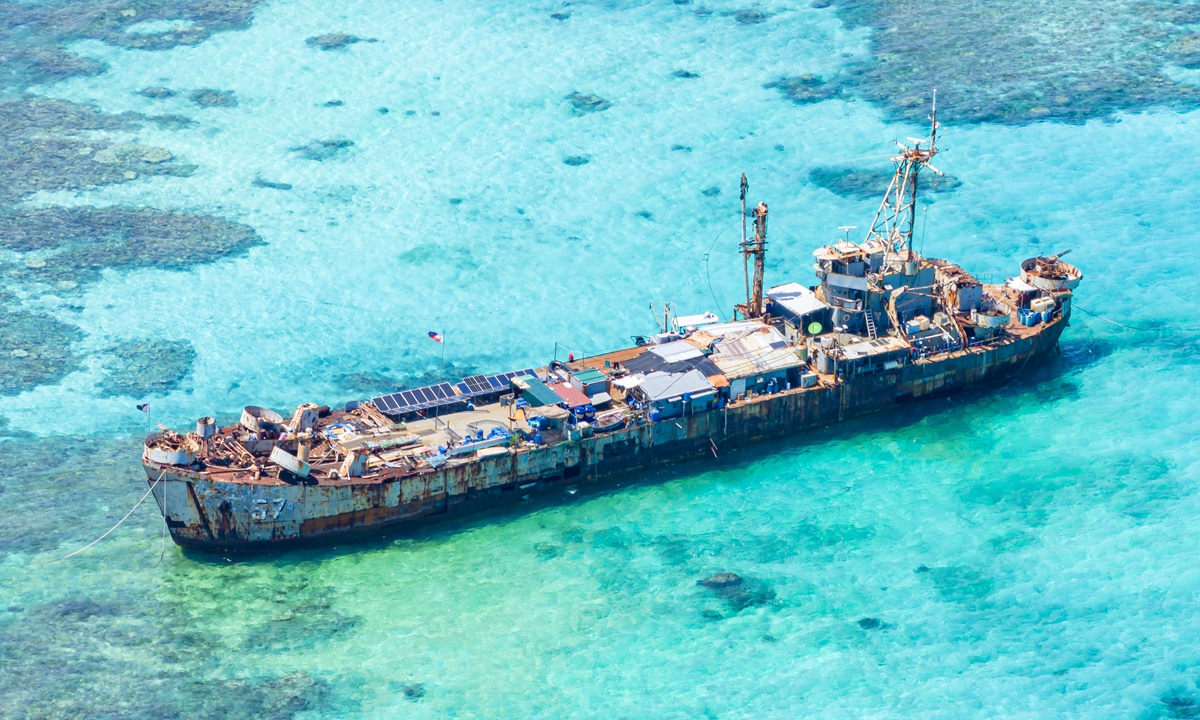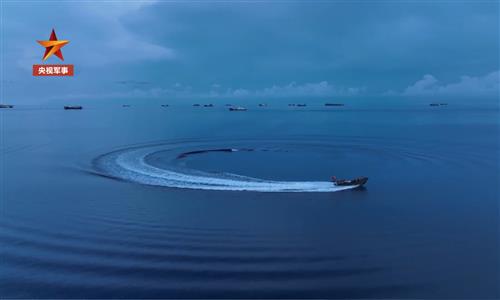Philippines urged to abide by ‘provisional arrangement’
China shows goodwill, reiterates positions over Ren’ai Jiao

The Philippine illegally grounded warship BRP Sierra Madre at Ren'ai Jiao Photo: Courtesy of South China Sea Ecological Center of China's Ministry of Natural Resources
Manila is being urged to abide by its promises after China and the Philippines reached a "provisional arrangement" on managing the situation at Ren'ai Jiao, or Ren'ai Reef in the South China Sea.
It remains to be seen how the arrangement is carried out, Chinese analysts said, warning against the Philippines' tendency, with US support, to invite more countries into the sensitive waters to give Manila greater bargaining chips.
Ren'ai Jiao is part of China's Nansha Qundao and China has sovereignty over Ren'ai Jiao and the rest of Nansha Qundao as well as their adjacent waters, according to a Foreign Ministry spokesperson's remarks released on Monday.
By keeping its warship grounded at Ren'ai Jiao for decades, the Philippines has been violating China's sovereignty and the Declaration on the Conduct of Parties in the South China Sea (DOC), especially Article 5, which stipulates that the parties should refrain from the action of inhabiting the uninhabited islands and reefs. China continues to demand that the Philippines tow away the warship and restore Ren'ai Jiao's state of hosting no personnel or facilities.
Between now and when the warship is towed away, should the Philippines need to send living necessities to the personnel living on the warship, China is willing to allow it in a humanitarian spirit if the Philippines informs China in advance and after on-site verification is conducted. China will monitor the entire resupply process.
If the Philippines were to send large amounts of construction materials to the warship and attempt to build fixed facilities or permanent outposts, China will absolutely not accept it and will resolutely stop it in accordance with the law and regulations to uphold China's sovereignty and the sanctity of the DOC.
Based on these three points, China recently had a series of consultations with the Philippines on managing the situation at Ren'ai Jiao and reached a provisional arrangement with the Philippines on humanitarian resupply of living necessities. The two sides agreed to jointly manage differences on maritime issues and work for de-escalation in the South China Sea.
Ding Duo, a deputy director of the Institute of Maritime Law and Policy at China's National Institute for South China Sea Studies, told the Global Times on Monday that the arrangement shows progress has been made by the two sides in managing frictions and avoiding crisis at sea, which can help reduce misunderstanding and misjudgment.
The next thing is to observe whether the Philippines will abide by the arrangement, or say one thing and do another, Ding said.
The Philippine Foreign Ministry on Monday rejected the idea that Manila will inform Beijing in advance and allow verification of deliveries, according to media reports.
Based on the principled position of China on dealing with the current situation at Ren'ai Jiao, China reached provisional arrangement with the Philippines on humanitarian resupply of living necessities, which reflects the goodwill of the Chinese side, Chinese Foreign Ministry spokesperson Mao Ning said at Monday's routine press briefing.
"We hope the Philippines will keep its word and work with the Chinese side to get the situation under control in a proper way," Mao said.
Those remarks suggested some differences remain between China and the Philippines over the issue, analysts said.
There were signs that suggested the Philippines is also introducing more non-regional countries to intervene in the issue. Television program 24 Oras on July 16 reported that the Philippines could involve units from other countries in its regular resupply missions. In such a scenario, ships and aircraft from countries such as the US, Japan, UK and Australia could conduct simultaneous patrols with Philippine forces in the South China Sea.
The Philippine military's spokesperson said in a separate statement on Sunday that Manila "will exhaust all means before seeking foreign intervention" in its resupply missions, according to a Reuters report.
The Philippines is looking to forge reciprocal troop access agreements with Canada, France, New Zealand, and other countries, and hopes the agreements will be signed next year, Reuters reported in another article on Monday.
With the US shadow clearly visible behind the Philippines' provocations, Ding believes Washington will not make major changes in its approach. It hopes the Philippines will continue to stir up troubles, while not causing consequences that go beyond its control.
The scenario of US-convened joint exercises, joint patrols and cooperation between coast guards is possible, and it will continue attempts to escalate the disputes into a security issue and back the Philippines in the diplomatic and legal realm, Ding said.
The moves are in line with the US' "Indo-Pacific Strategy," which advocates enhanced coordination between allies and partners, Ding said.
The two countries want to grasp the opportunity before the Philippines' midterm election in 2025 and the US' presidential election in November 2024 to consolidate the bilateral and multilateral "security" mechanisms, as there are varying opinions among different departments in the Philippines on how to view and handle the South China Sea issue, said the expert.
They also want to woo as many non-regional countries as possible into the South China Sea to complicate the situation and increase the Philippines' bargaining chips, Ding noted.
Manila wants to leverage the US' influence to maximize its interests in the South China Sea, but analysts warned it should be cautious of "US support." "The US is just using the Philippines and fooling Filipinos, telling them that they will support them. But we have seen in many cases that the US does not provide assistance and aid to its allies," Herman Tiu Laurel, founder of the think tank Philippine-BRICS Strategic Studies, told the Global Times.

